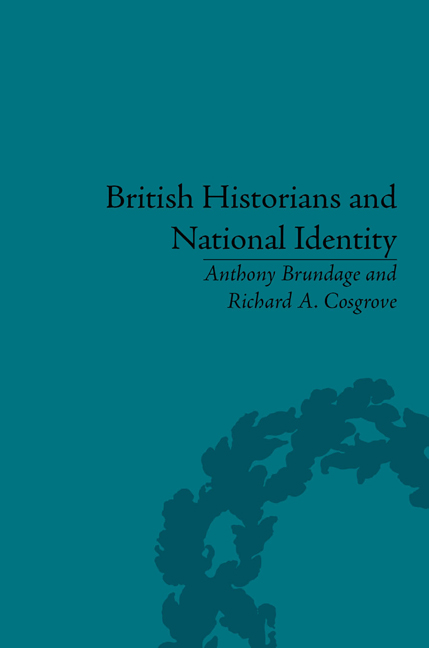Book contents
- Frontmatter
- CONTENTS
- Dedication
- Acknowledgements
- Introduction
- 1 Demythologizing the Nation's Past: David Hume's History of England
- 2 Catharine Macaulay's Vindication of Radicalism and the Republican Tradition
- 3 Reassessing Religion and the National Narrative: John Lingard and the English Reformation
- 4 Placing the Constitution at the Heart of National Identity: Henry Hallam and Constitutional History
- 5 Thomas Babington Macaulay: Writing the History of a Progressive People
- 6 The Glories of the Reformation and the Origins of Empire: J. A. Froude's Celebration of the Tudor Era
- 7 Edward Augustus Freeman: Liberal Democracy and National Identity
- 8 William Stubbs: The Continuity of English History as National Identity
- 9 Celebrating the People: J. R. Green's Short History
- 10 Samuel Rawson Gardiner: Incorporating Dissent into the National Story
- 11 In Thrall to English Tradition and Character: G. M. Trevelyan's Panoramic Histories of the Island Race
- 12 The Anglosphere as Global Model: Winston Churchill's History of the English-Speaking Peoples
- Conclusion
- Notes
- Works Cited
- Index
7 - Edward Augustus Freeman: Liberal Democracy and National Identity
- Frontmatter
- CONTENTS
- Dedication
- Acknowledgements
- Introduction
- 1 Demythologizing the Nation's Past: David Hume's History of England
- 2 Catharine Macaulay's Vindication of Radicalism and the Republican Tradition
- 3 Reassessing Religion and the National Narrative: John Lingard and the English Reformation
- 4 Placing the Constitution at the Heart of National Identity: Henry Hallam and Constitutional History
- 5 Thomas Babington Macaulay: Writing the History of a Progressive People
- 6 The Glories of the Reformation and the Origins of Empire: J. A. Froude's Celebration of the Tudor Era
- 7 Edward Augustus Freeman: Liberal Democracy and National Identity
- 8 William Stubbs: The Continuity of English History as National Identity
- 9 Celebrating the People: J. R. Green's Short History
- 10 Samuel Rawson Gardiner: Incorporating Dissent into the National Story
- 11 In Thrall to English Tradition and Character: G. M. Trevelyan's Panoramic Histories of the Island Race
- 12 The Anglosphere as Global Model: Winston Churchill's History of the English-Speaking Peoples
- Conclusion
- Notes
- Works Cited
- Index
Summary
Edward Augustus Freeman, once so prominent a figure in Victorian historiography, no longer holds such a lofty position. The combination of personal eccentricities plus revisions to the conclusions he advanced in his epic five volumes on the Norman Conquest have rendered him a scholar of lesser attainment among his Victorian contemporaries. On subjects such as vivisection and fox-hunting, his views differed from those of society at large to the point where Lytton Strachey counted Freeman among the select group of eminent Victorians whose inclusion did not signify admiration. Despite the doubts of posterity, Freeman retains an importance because he represented best the transition from a romantic view of the national narrative to one secured on a scientific basis. This change occurred through ‘epistemological orientations and methods of research that drew history away from its literary origins into a new field of social science’. Freeman possessed unique ideas about the nature of history that attracted attention to the discipline even if they did not endure.
In his personal life Freeman was raised by his paternal grandmother under the guardianship of an uncle after being orphaned at an early age. One blessing he did enjoy was an income of £600 per annum from his family's coal mine interests that supported him well until his income increased through his writings. Freeman took a BA degree at Trinity College, Oxford in 1845 and shortly thereafter resolved to pursue a career as historian.
- Type
- Chapter
- Information
- British Historians and National IdentityFrom Hume to Churchill, pp. 95 - 108Publisher: Pickering & ChattoFirst published in: 2014

